NFTs have had a huge impact on the art industry. Artists never had a proper platform to sell their artwork until NFTs arrived. But how do you actually become an NFT artist?
There are numerous steps you need to take if you want to become an NFT artist. That being said, becoming a digital artist is easier than you think. But building a following and staying consistent is where the road can get rough.
How to Become an NFT Artist
To become an NFT artist, follow these 10 steps below.
1. Choose Your Art Niche
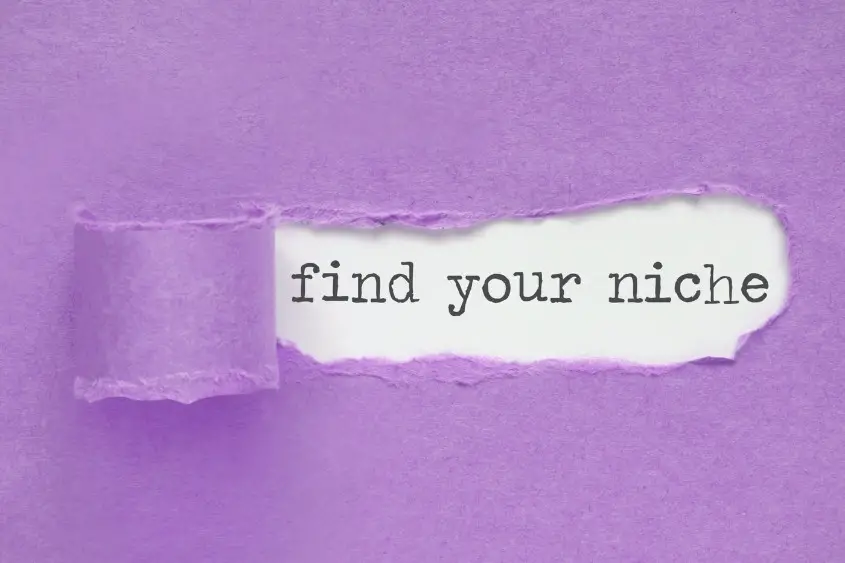
Before you begin your long and exciting journey on becoming an NFT artist, you need to figure out what kind of artwork you are going to create. Having a consistent niche when creating your NFT art can help you better your skills and will let your audience understand what type of artwork you create.
For example, if you are an artist who enjoys creating digital portraits of famous sports stars, then your audience will learn that you like sports and create sport-related pieces.
If one day you decide to release a digital painting of a unicorn, however, you may throw your followers off and confuse them. This could potentially be good or bad, but it’s best to stay consistent in your style so people can learn to either love or hate your artwork.
Choosing your art NFT art niche should be fairly simple. It could be photography, painting, or maybe doodles, the sky is the limit when choosing your art niche. My main advice for creating your art niche is to choose a topic you enjoy creating. If you pick something just because it’s popular or trending, you may not experience the results you’re hoping for.
The great thing about NFT art is that you can turn anything into a one-of-a-kind masterpiece. You can make music, videos, paintings, drawings, photos, literally anything! So, stay true to who you are and what your interests are, then let your audience decide what they like and what they don’t like.
2. Decide How You’ll Create Your NFT Art
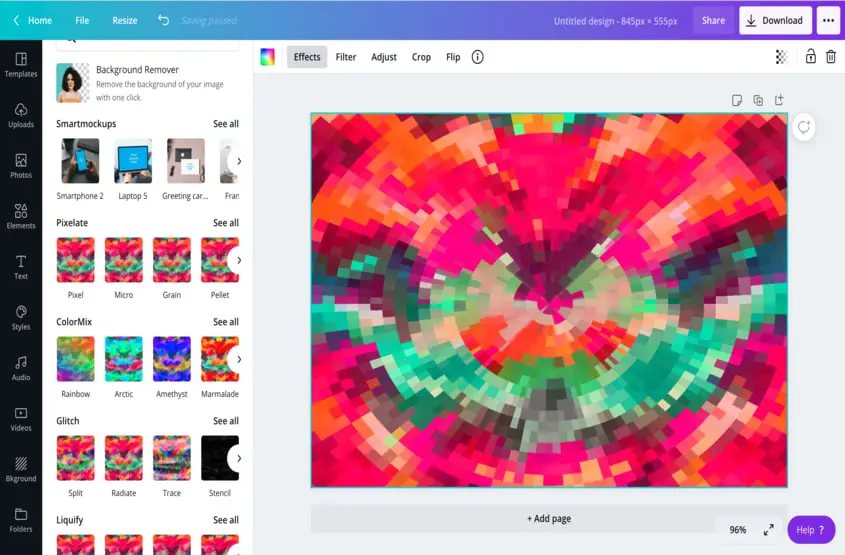
After you have determined your NFT art niche you need to decide how you are going to create your art. If you are creating something from scratch or you need to edit your art, then you need to decide on some sort of editing software.
- Editing software for images: If you need to create or edit digital images, there are a few popular options amongst NFT artists. Adobe Illustrator, Lightroom, and Photoshop are all good choices for editing your images.
- Creation Software For GIFs and Pixel Images: Adobe Photoshop (GIFs) and Piskel (animated sprites and pixel art)
- iPad and Pro Create: One of the most popular tools amongst NFT artists in an iPad equipped with Pro Create. Pro Create allows you to paint and illustrate using your iPad or iPhone. One example of an NFT artist who uses Pro Create is FEWOCiOUS.
Ultimately, the tools and software you need to be a successful NFT artist come down to what kind of art you create. If you want to draw and paint digitally, try Pro Create. If you are a photographer, perhaps Photoshop will be your best bet.
3. Know Your NFT Art File Format

Once you decide the type of NFT art you’re going to create, you will need to choose what file format you want to create it as, for each type of art, there are different supporting file formats.
Here’s a list of potential digital art file formats that are acceptable on many NFT marketplaces:
- Audio: mp3, wav
- Image: gif, jpg, png
- Video: mp4
For a complete guide on NFT art and the file size limitations and restrictions, check out our guide.
You can also attach unlockable content to your NFT art, meaning when someone buys it they have access to download the highest quality format you provide. That way you don’t have to create the token as such a large file that may have issues loading properly on some NFT marketplaces.
4. Create Your NFT Art
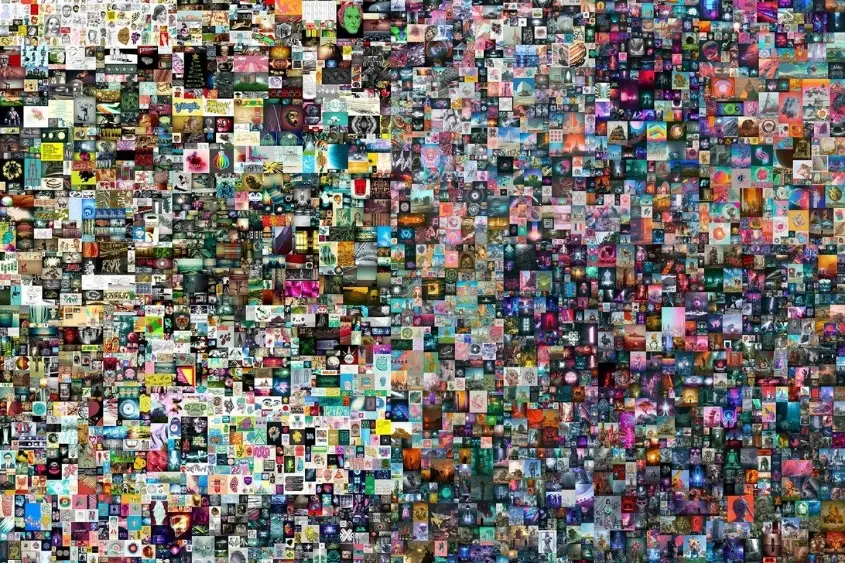
Now it’s time to create your NFT art!
Keep in mind that when you create your NFT art, it might not be perfect, especially if you’re just getting started, and that’s okay. The most important thing you can do is create your NFT art, every day. The reason you should create new art every day is for practice and to get your creative juices flowing.
Beeple is a perfect example of someone who stayed consistent, and eventually, his work paid off. He created a piece of digital art every single day for 13 years, then, he ended up selling his NFT art ‘Everydays’ The First 5000 Days for $69 million!
Creating your NFT art should be something you enjoy and something you’re passionate about doing. Becoming a successful NFT artist takes time. A whole lot of time!
5. Sell Your NFT Art
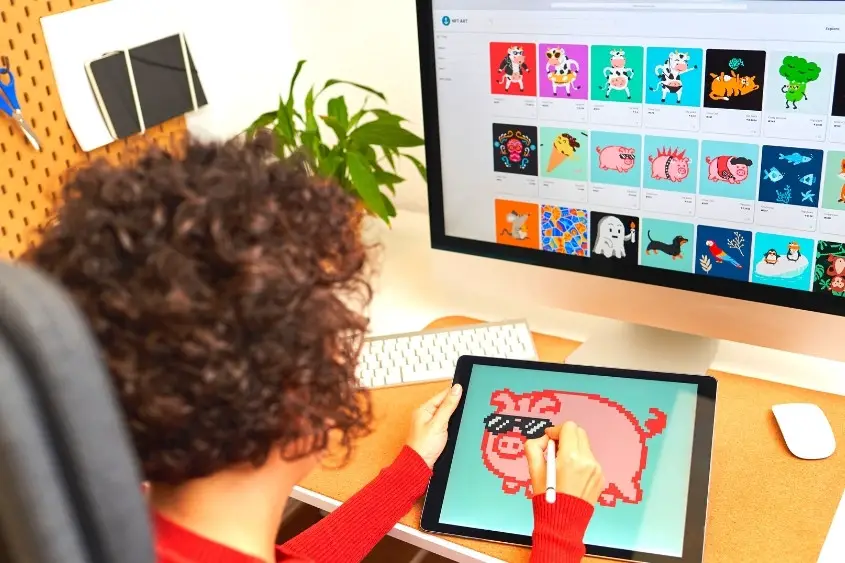
Now things start to get exciting! When you have your first piece of NFT art ready to sell, you need to choose which marketplace is right for your collection. There are many NFT marketplaces to choose from, each with its own pros and cons. Moreover, new marketplaces will soon be appearing as the world of NFTs and NFT art progresses.
Some of the most popular NFT marketplaces for selling NFT art include:
| NFT Marketplace for selling NFT art | Pros and Cons |
|---|---|
| OpenSea.io | Pros: Good for beginners Cons: The catch-all for NFTs |
| Rarible.com | Pros: Easy to mint tokens Cons: Art is hit or miss |
| NiftyGateway.com | Pros: Premier Marketplace Cons: Must apply to be an artist and you can only deposit Nifties from collections launched on Nifty Gateway |
| SuperRare.co | Pros: High-end pieces Cons: Slow onboarding/ must apply to be an artist |
When choosing an NFT marketplace to sell your NFT art, you might want to use one marketplace, or perhaps you’d benefit from selling your art on several marketplaces, the choice is yours, just make sure you are always offering something different if you decide to use more than one NFT marketplace.
If you want to learn more about other NFT marketplaces to sell your art, here are 9 of the best NFT marketplaces for buying and selling NFTs.
Tip: When you create your profile on an NFT marketplace, make sure to include links to your social media account, this will help build an audience for your art. If you don’t have social media, get it and start sharing your art with the world!
6. Build Your Community

Building a community is crucial if you are trying to sell your NFT art. You need to build a following or an audience, otherwise, people won’t know who you are or that your art even exists. There are many ways you can build a following to help sell your NFT art, but, what are the best ways to build a following?
To build a following for your NFT artwork you need to build a brand around your art, making sure to include your NFT art every step of the way. Being active in the NFT community such as social media forums, podcasts, and blogs will help you establish credibility and trust with your audience.
The reason this step is so important is that your brand reputation is critical when it comes to the value of your art. The more that people know about you, the more they understand you and what you’re about. This makes purchasing a piece of your artwork even easier for both you and your community.
Think about it this way, would you rather buy something from someone you know and trust, or buy something from a random stranger you know nothing about? The answer is simple.
There are a few ways you can go about building a loyal following, let’s go through some of the best options:
Social Media
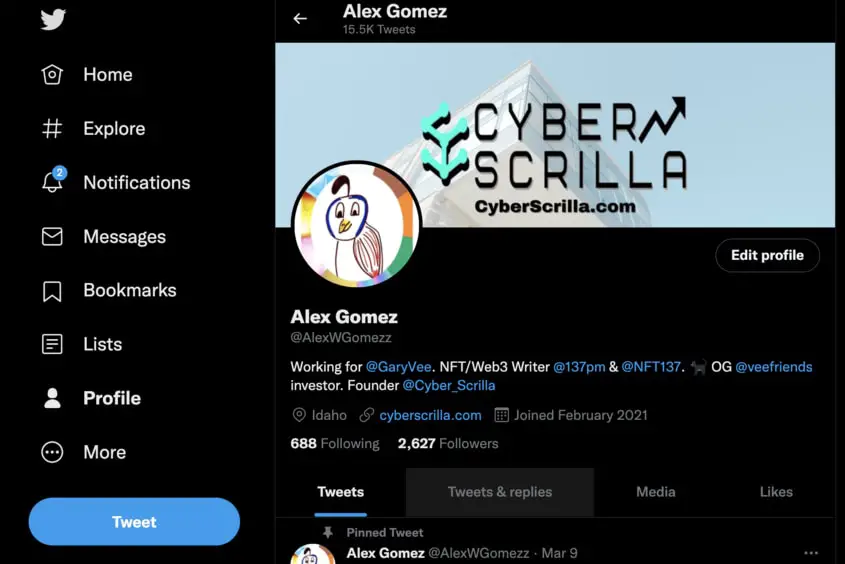
Social media is one of the easiest ways to start building your following for your NFT art creations. In order to take advantage of social media, make sure to join every social media platform you can and then bring the noise.
Once you are up and running, post at least 1-2 times daily. You should be posting your artwork and asking for feedback, as well as giving feedback to other artists and helping them out where you can.
Try posting one piece of artwork per day across all your social media accounts for six months and see what happens. Using corresponding hashtags to help your media posts reach the correct audience will help you be more successful in gaining followers who engage with your posts, which is exactly what you want.
Here are some trending hashtags I’ve seen on social media which are likely to gain even more traction in the years to come.
- #NFT
- #NFTs
- #NFTART
- #NFTARTIST
- #NFTCOMMUNITY
- #NFTCOLLECTOR
- #CRYPTOCURRENCY
- #ETHEREUM
- #ETH
- #DIGITALART
- #DIGITALARTIST
When creating your social media account, decide if you are going to use your personal account or create an account specifically for your artwork. This is the personal branding vs product branding scenario I mentioned earlier.
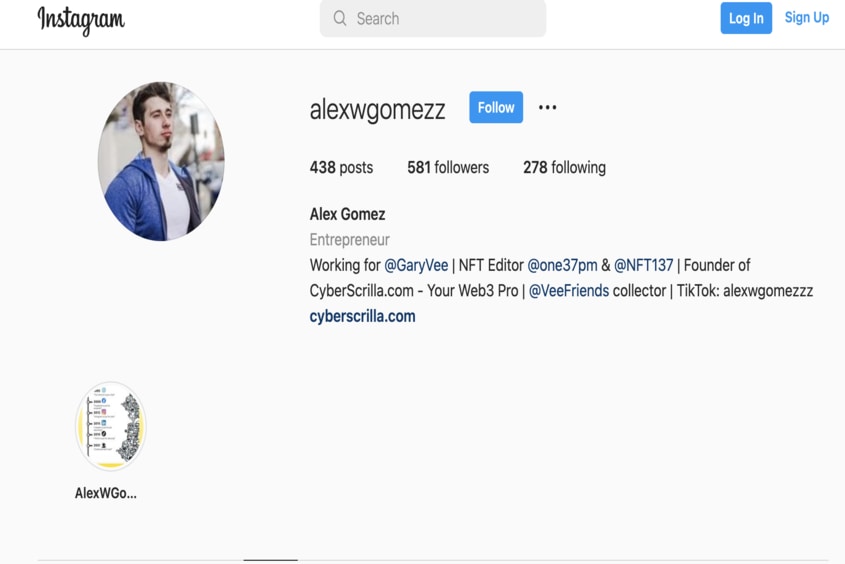
Regardless of what you choose, make sure to fill in your bio effectively, providing details that describe yourself as an NFT artist, what kind of art your make, and links to your other social media accounts and personal sites you might have.
Basically, you want to create a webbed network so you are reaching people across all platforms. With that being the case, try to make sure your social media name is the same across all platforms, this helps with your brand recognition.
Social media can be a lot of work to maintain. That’s why it’s best to start slow and don’t get worked up about how many followers you have, or how many likes your post gets.
Just focus on providing content and being yourself. Remember, we all start from nothing. It takes time, patience, and consistency to grow your following; but I know you can do it!
Create a website
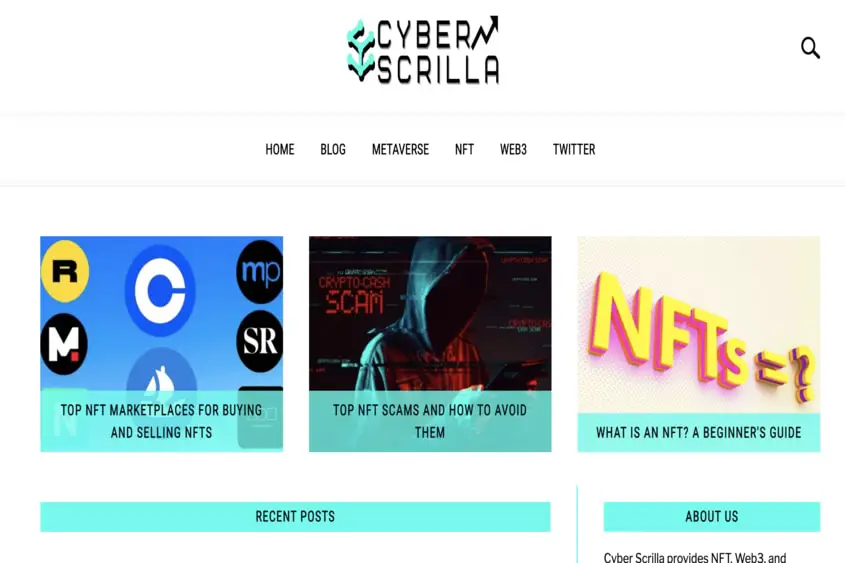
Aside from social media, you can choose the technical route and create your own website. Now, even if you decide to create your own website, it’s still wise to be active on social media and use it as a means to supplement traffic to your website, so you can get eyes on whatever it is you’re offering.
A website can benefit your NFT art tremendously if you use it right. You can display your NFT art collection on your site, offer links to your art’s marketplace, create a blog that draws traffic organically, or even offer a service such as creating custom artwork for people or training others how to create their own art. The opportunities are endless.
Ultimately, creating your own website is a good option for building your audience, especially if you’re decent with computers.
Otherwise, you can hire someone to create a website for you. If you’re interested in creating your own blog site, check out this article where I break down step-by-step, how to create your own site using WordPress.
7. Be Active in the NFT Community
It’s time to tie this all together. Once you have your social media accounts set up and your website up and running (optional), now it’s time to get active! You should be spending time in your community, answering questions, asking questions, and taking polls.
For example, if you’re an artist on Rarible.com or OpenSea.io, get on their forums and start scanning through the posts. Answer any questions you feel confident answering and if additional information is required, you can always send them to your blog, YouTube video, or TikTok video you created on that subject. Help others, help yourself.
Also, never be afraid to ask questions. If you have a question, you can figure it out through trial and error or ask someone in the community. Surely, if you are asking the question, then it’s very likely someone else has that same question.
Overall, building you following comes down to passion, patience, consistency, and selflessness. You need passion to begin, patience while you stay consistent, and selflessness to help others solve their problem.
In fact, this reminds me of the time I asked Bored Elon Musk on Twitter; “What is one major tip you would give to an aspiring entrepreneur?” His answer was priceless.
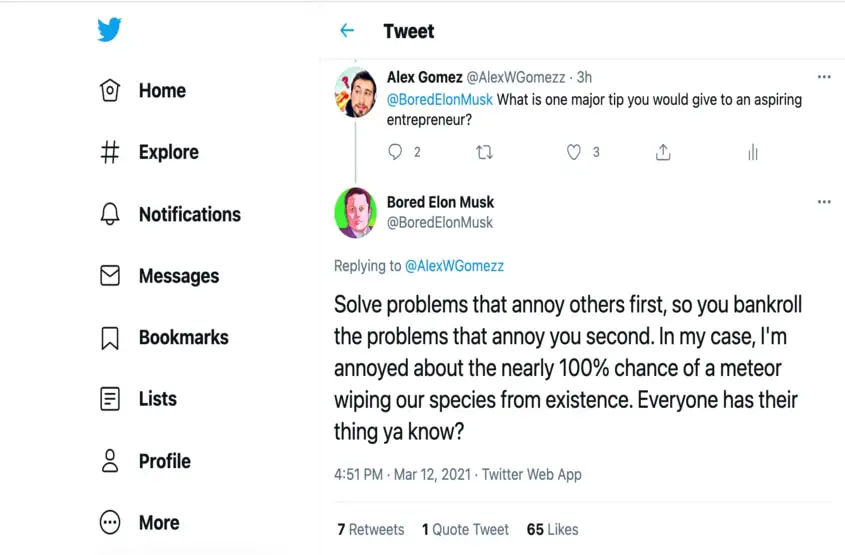
8. Stay Consistent
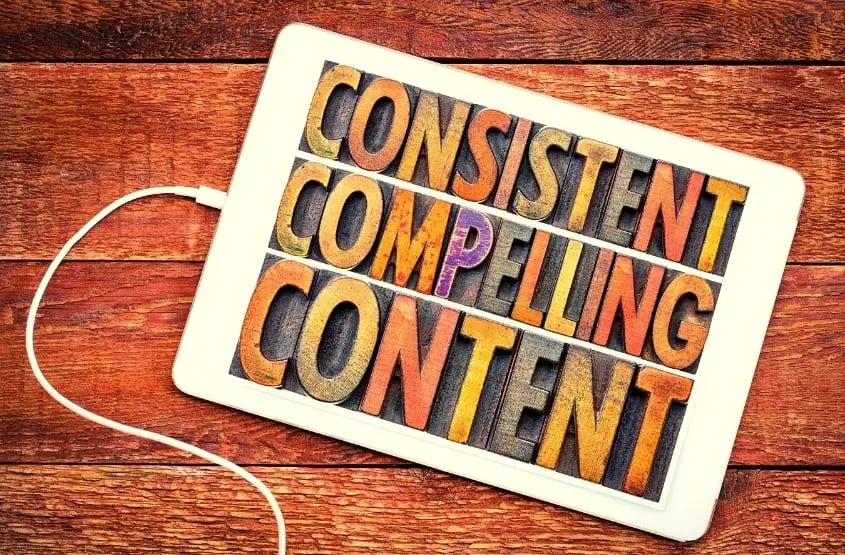
Consistency is key. It doesn’t matter what you do in life, consistency is everything. If you are expecting to become a successful NFT artist overnight, I wish you the best of luck because you’re going to need it. Without consistency, you have minimal trust and without trust, no one cares.
You need to show people you are serious about what you do and about the NFT art, you create. Beeple is the perfect example. It took him over 13 years to see any large amount of success, but it sure did pay off.
If you aren’t consistent with your work then you aren’t giving yourself a fair chance. I recommend staying consistent for as long as you want to be successful, but at least a minimum of 6 months before seeing any results. If you don’t see a positive trend after 6 months, then maybe it’s time to reconsider your strategies and head back to the drawing board.
9. Be True to Yourself As an NFT Artist
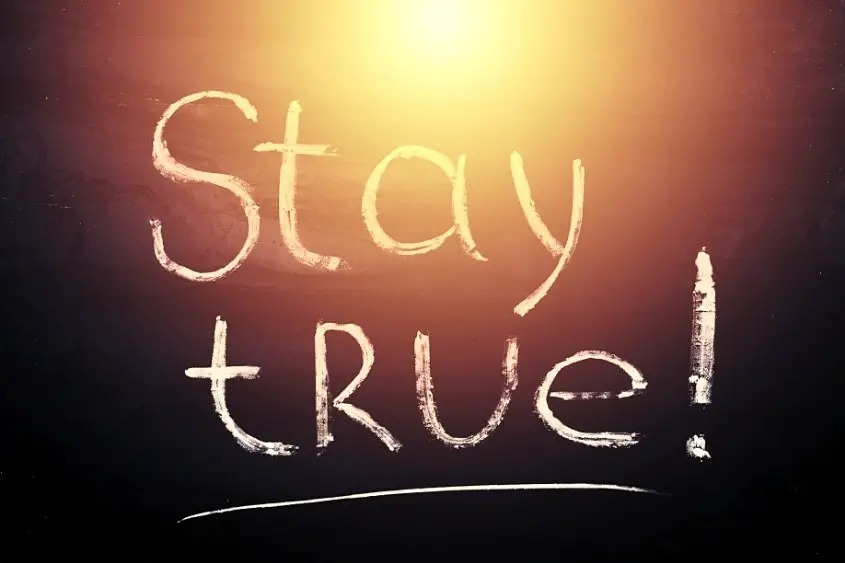
As if staying consistent isn’t hard enough, you need to make sure you always stay true to yourself and the art you craft. The reason I mention this is that many people get caught up in the trends, completely forgetting why they started making NFT art in the first place.
Trends aren’t a terrible thing by any means, but make sure that regardless of the trend, you still add your own touch to your NFT artwork.
Staying true to yourself and what you create determines how people view you as an artist and as a human. If you’re always jumping on the latest trending art creations, you may be seen as a money-hungry NFT art-slanging fiend, and as a result, a lack of trust begins to settle with your community.
Moreover, creating art that you love to create will help you stay motivated and creative, hopefully on a consistent basis.
10. Don’t Give Up
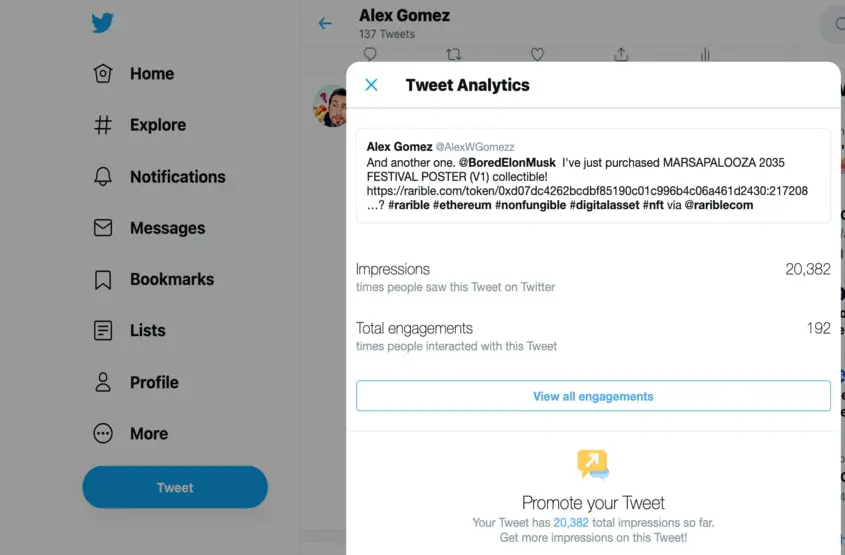
Of course, I saved the best for last. These three simple words are the make-it-or-break-it factor when it comes to your success as an NFT artist. One of the most common misconceptions about people starting a new journey is that success happens overnight.
Sure, some people may have seen instant success, but as NFTs continue to advance and become more common in the world, your odds of success begin to dwindle.
For your sake, don’t give up. It may take years to gain an audience who is loyal enough to purchase your NFTs consistently, but keep in mind, all it takes is one piece of art to change your life.
If I had to leave you with one last piece of advice it would be to enjoy your journey. Your journey is the foundation of your entire art career. The fact that every decision you make and every piece of art you put out is the building blocks of your story is absolutely amazing.
So, when you’re feeling bad because your art isn’t selling, or maybe someone said something negative about it, just keep pushing forward and keep your eyes on the prize, you can make your dreams a reality.
Being an NFT artist is an exciting journey. Understand that in general, being a successful artist takes time, consistency, and dedication. Create your art, build a community, and help others along the way.

20 thoughts on “How to Become an NFT Artist (10 Actionable Steps to Success)”